
Everything You Need To Know About Labor Trafficking
When we hear the term “human trafficking,” most of us immediately think of sex trafficking. In reality, labor trafficking is more prevalent than sex trafficking both locally and globally. Here’s everything you need to know about labor trafficking:
The Numbers: Sex Trafficking vs. Labor Trafficking
The International Labor Organization (ILO) in partnership with Walk Free Foundation in 2017 estimated that 4.8 million people are victims of sex trafficking worldwide.
But as large and devastating as that number is, sex trafficking only represents a small portion of the global human trafficking problem.
There are 20.1 million people worldwide who are victims of labor trafficking.
16 million are exploited in the private sector – domestic work, agriculture, construction, etc. – while 4.1 million are exploited through state-imposed labor.
That makes labor trafficking more than FOUR TIMES as common as sex trafficking globally.
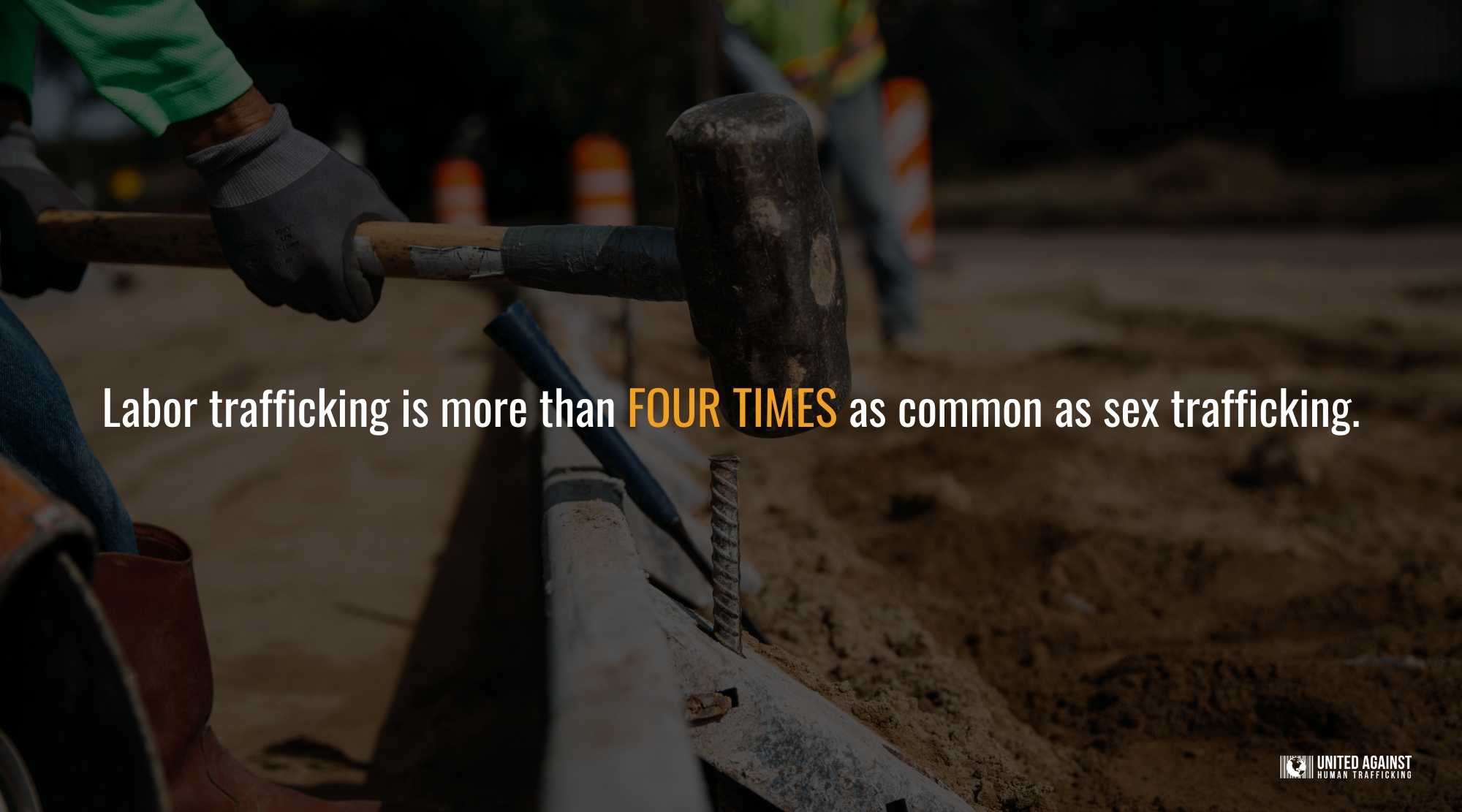
What is labor trafficking?
When somebody is compelled to work through force, fraud, or coercion, this is considered labor trafficking.
Force
“After working in the factory all day, the overseers locked us in our sleeping quarters so we couldn’t leave during the night.”
FRAUD
“Recruiters promised me certain wages when I agreed to the job, but then they took my visa and told me I had to work for much less than promised if I wanted it back.”
COERCION
“My boss told me if I tried to quit, they would hurt my children.”
Does labor trafficking happen in the United States?
In 2021, The National Human Trafficking Hotline identified 4,214 likely victims of labor trafficking – 3,583 victims of labor trafficking only and 631 victims of sex and labor trafficking.
This number of reported victims, however, barely scratches the surface of the problem.
The University of Texas at Austin in 2016 estimated that more than 300,000 adults are trafficked for labor in Texas alone each year.
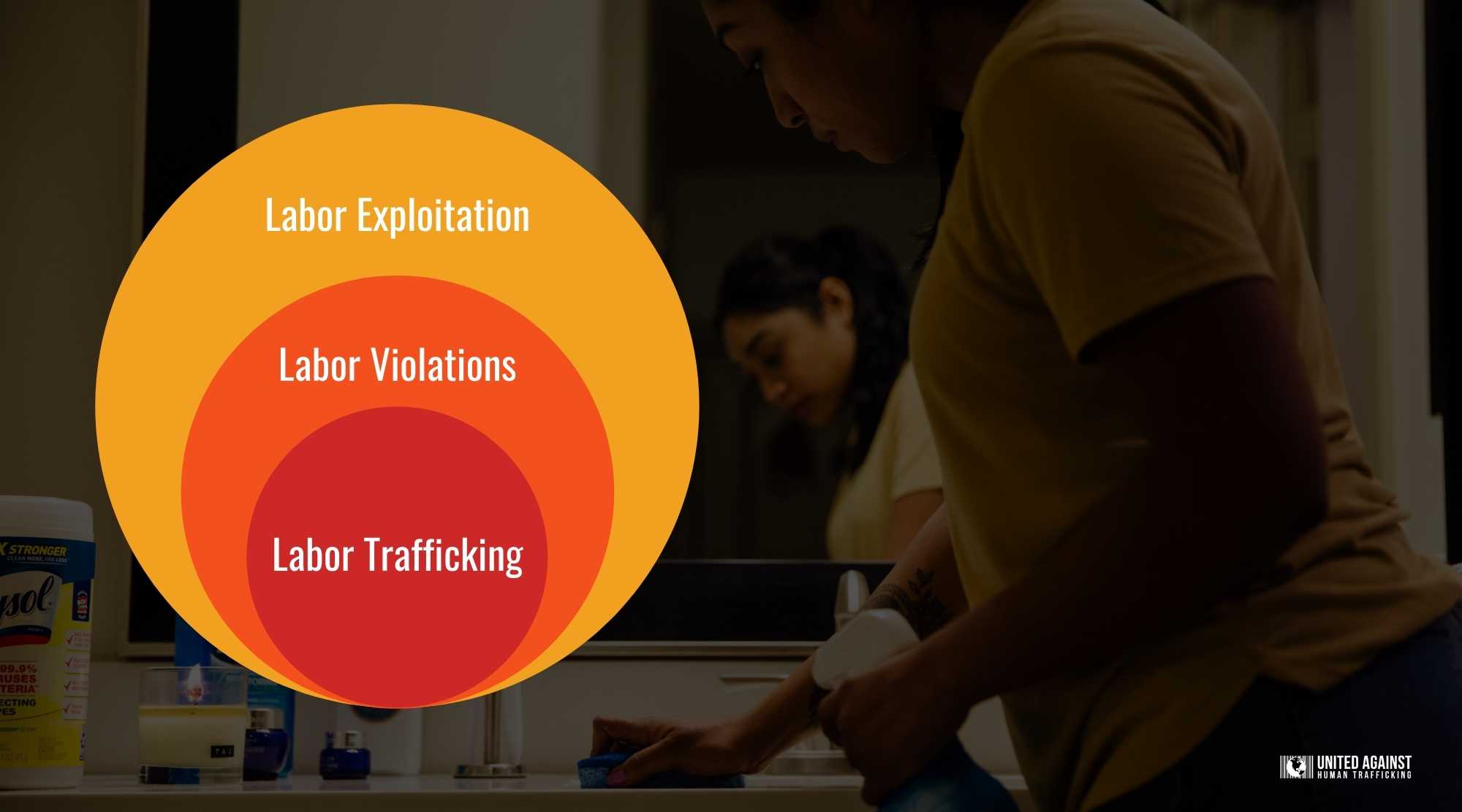
What are labor exploitation and labor violations?
How do they relate to labor trafficking?
‘Labor trafficking’ and ‘labor violations’ are legal terms with legal definitions, while ‘labor exploitation’ is not.
According to the Laboratory of to Combat Human Trafficking (LCHT), a labor violation is when “employers violate federal, state, or municipal laws related to worker treatment, workplace safety, or recordkeeping requirements.” Examples of labor violations include not paying overtime and/or paying below minimum wage.
Like the adage “a square is always a rectangle, but a rectangle is not always a square,” labor violations are always labor exploitation… but labor exploitation does not always equal labor violations.
Labor exploitation can also describe practices that are legal but considered morally/socially objectionable – such as paying workers low (but at least minimum) wages when workers assert their job deserves more compensation – while labor trafficking and labor violations are crimes by definition.
Remember: for an act to be considered labor trafficking, there must be elements of force, fraud, and/or coercion.
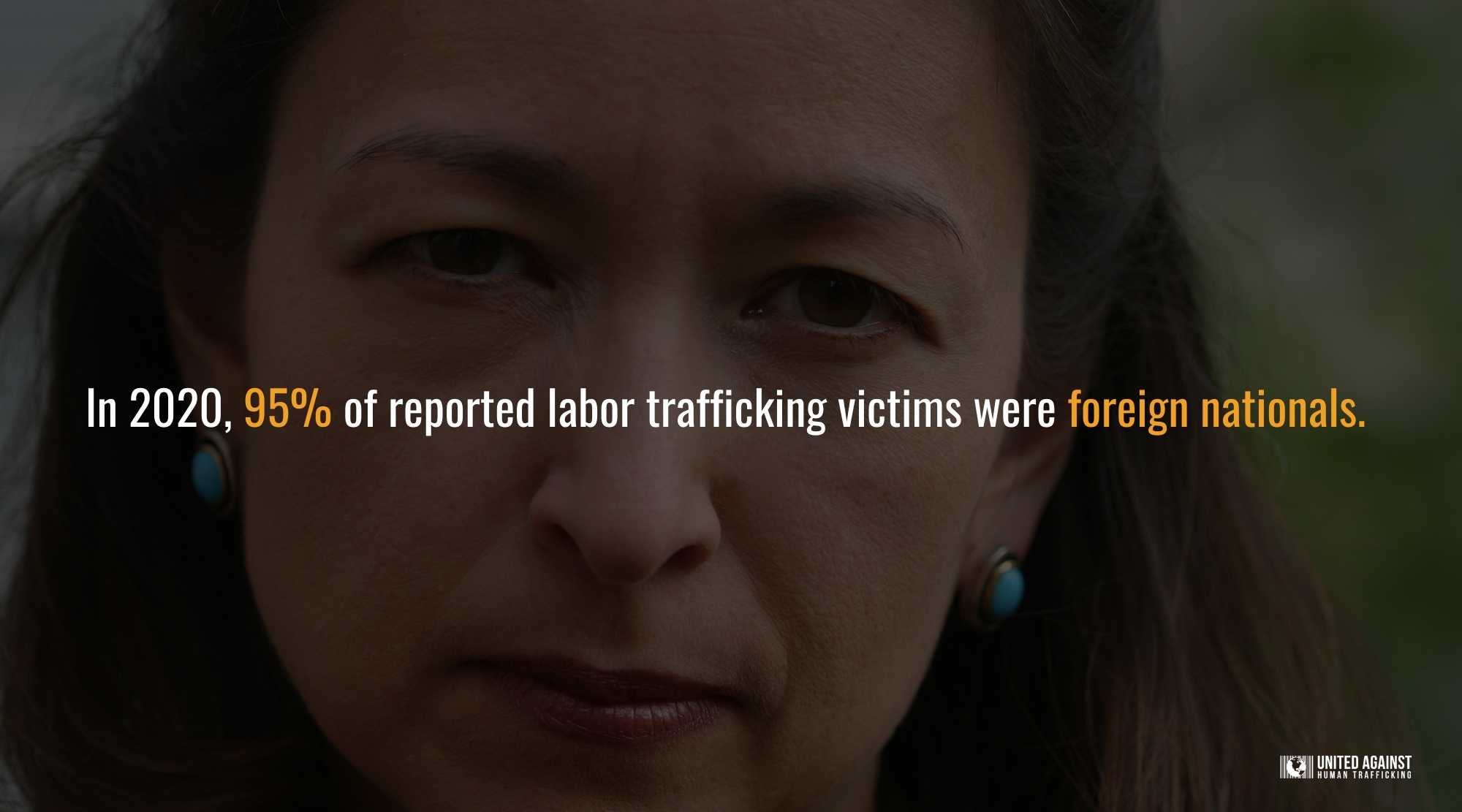
Who is at risk of becoming trafficked for labor?
In the United States, immigrants and refugees are highly vulnerable to labor trafficking.
In 2020, The National Human Trafficking Hotline identified 2,765 likely labor trafficking victims by immigration status: either domestic individuals (US citizens and legal permanent residents) or foreign nationals.
95% of these labor trafficking victims were foreign nationals.
Traffickers take advantage of new immigrants and refugees because they often do not know domestic labor laws. They also generally fear deportation, which gives a trafficker’s threats an even sharper edge and severely deters victims from speaking out.
In what industries does human trafficking occur most?
According to a 2014 report by the Urban Institute Justice Policy Center in collaboration with Northeastern University, the US industries with the highest rates of labor trafficking victimization are agriculture, hospitality, domestic work, and construction.
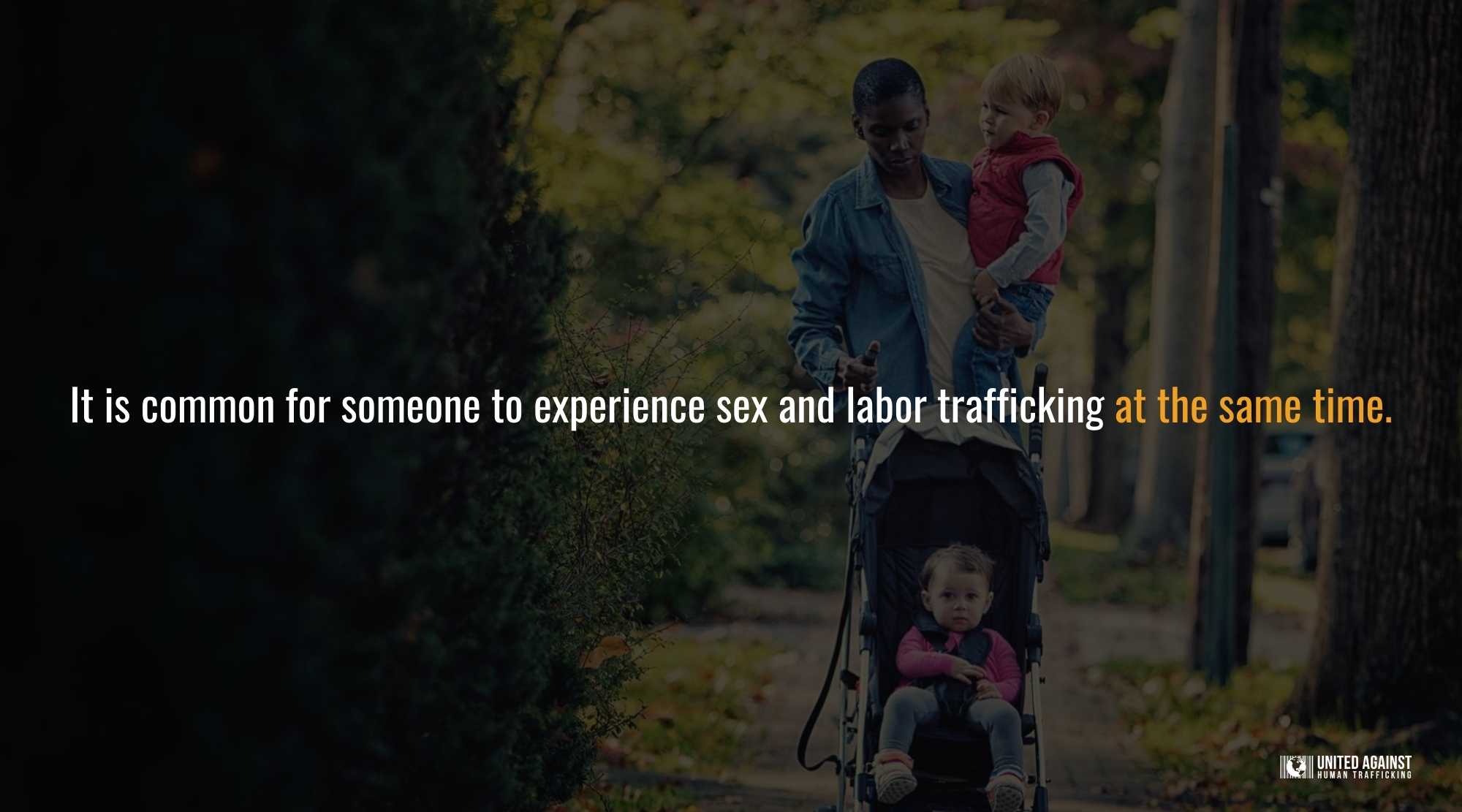
How do sex and labor trafficking intersect?
It is common for someone to experience sex and labor trafficking at the same time.
As mentioned previously, The National Human Trafficking Hotline identified 631 likely victims of sex and labor trafficking in 2020.
For example, an immigrant nanny could be defrauded out of their visa to make them compliant to their employer’s demands, while also being forced into having sex with their trafficker’s friends.
How can you fight labor trafficking?
If you suspect somebody is being trafficked, call the National Human Trafficking Hotline at (888) 3737-888.
If we suspect a person is being exploited for labor, we need to ask 2 questions to determine if it is human trafficking:
- How did the person come to have this job? (Were they recruited, harbored, transported, provided, obtained, patronized, or solicited into the job?)
- Was the person forced, defrauded, or coerced into taking or staying in the job?
If you answer “yes” to both those questions, it’s human trafficking.
Request a free education workshop – virtual or in-person – to learn more!
Shop Fair Trade
Lastly, it is virtually impossible to buy ONLY products that are ethically sourced and that can be guaranteed to have no labor trafficking occur during ANY part of the production process. This is a devastating fact of our modern world. This does not mean, however, that we should not try our best to consume responsibly when possible.
We can research companies and see what, if any, responsible sourcing/supply chain responsibility protocols they use. If they do not, we can demand they do so. We can shop fair trade if/when we can afford it. While these are small steps, they can help us feel like we have just a little more control over how the goods we buy get to our carts.
Check out Fair Trade Certified’s website to find ethically sourced products.
April Newsletter
March Newsletter
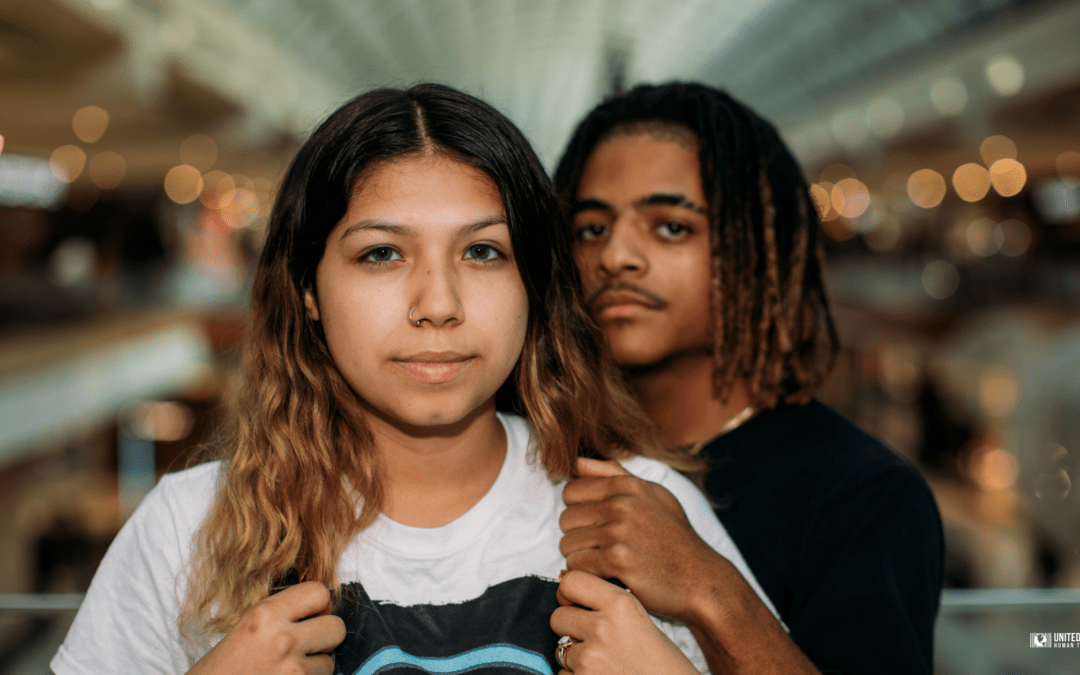
This Isn’t Love: Teaching Youth How to Avoid Manipulation
i love ur smile. That’s all it took to capture Ava’s* attention: one 4-word comment on her selfie.
She tapped the stranger’s name – Noah. His profile picture featured his deep umber eyes, but there was a brightness to them, a hint of laughter or mischief – she couldn’t tell which yet.
She sent him a private message. Butterflies flapped their wings in her stomach when the 3 little dots popped up that meant he was typing.
As they chatted, Ava learned she and Noah had a lot in common. They both were failing math and had detention for skipping school before. They both grew up in a struggling family in poor neighborhoods. They both had parents who were at work more than they were home.
After a week of Facebook messaging, the two swapped phone numbers.
A week later, they were texting and video chatting every day. Each time Ava heard the ping of a notification or the ring of a phone call, her heart fluttered in excitement.
Ava cherished Noah’s attention and support. She confided in him:
Ava started multiple fights at school – one of which left another student with a broken nose – and was sent to juvenile detention. She stayed there for months and heard little from her parents.
Feeling isolated and alone, she wondered if they even wanted her anymore. These feelings lingered even after her release. She told Noah all about it.
Noah said her parents didn’t care about what happened to her, but that Ava shouldn’t worry too much; soon she’d be 18, and she could leave them behind forever – like he did with his parents.
“I’ll take you to the most expensive restaurant in the city that day,” Noah promised. “You can have whatever you want.”
Sometimes people you trust use your vulnerability to exploit you.
Back then, Ava didn’t know Noah was grooming her to be trafficked.
She didn’t know that he targeted her for exploitation because the caption on her selfie read: “this is what it looks like to get out of juvie!” She didn’t know that waves of compliments aren’t love.
She didn’t know that Noah was intentionally sowing seeds of doubt about her parents. She didn’t know that isolating isn’t love.
Ava didn’t know the promise of gifts would make her feel like she owed him something in return. Ava didn’t know that expensive presents aren’t love.
Donate today to help teens like Ava spot the early warning signs of manipulation.

Like all of us, kids crave love and belonging – things groomers pretend to offer.
Youth who feel isolated, who are involved in the juvenile justice system, who long for connection, are highly vulnerable to manipulation. Once traffickers build enough trust, they use force, fraud, and/or coercion to compel victims into exploitation.
After being released from detention, Ava needed to go to secondary school: an alternative, temporary learning academy that juvenile offenders must attend before returning to regular school.

At Secondary School, Ava attended Real Talk: UAHT’s support group for at-risk youths.
Ava trusted very few people, especially adults. But UAHT’s facilitator, Taylor, seemed cool enough.
He brought snacks Ava hadn’t gotten to eat since before she was in detention. He listened to the teens when they talked about their difficult experiences and didn’t judge them.
UAHT facilitates Real Talk where vulnerable youth are often overlooked: secondary schools, juvenile detention centers, homeless youth shelters, afterschool programs, and much more.
In fact, some of Ava’s classmates recognized Taylor from when they were still in detention! What’s more, they liked the support group so much that they chose to retake it.
Your group is the only one we really pay attention to! I actually remember the stuff you tell us.

Ava learned a lot during the 10 sessions of Real Talk.
She learned how to use deep breathing to calm anxiety, how what she ate could affect her mood, and even some fun yoga poses!
She started bonding with her fellow classmates over their shared experiences and the vulnerability they showed during the group. Her math grade started to improve, too!
After 8 sessions, Ava finally built up the courage to tell her parents about how lonely she felt, and they planned to spend more time together.
But the most important lesson Ava learned was how to spot manipulation.
Taylor told the group that traffickers often find their targets on social media. They look for kids who post about being lonely, about troubles at home or in school.
When Ava heard that, the classroom went cold. Could Noah be manipulating her?
She didn’t want to believe it. No. It couldn’t be true. Noah was great! He talked to Ava every day and he told her she was pretty, that she deserved the best, that he wished he could take her away from all her troubles.
As the weeks went on, Ava looked forward to each new Real Talk session.
The more she learned about harmful versus healthy relationships, the more her doubts about Noah settled like a weight in her stomach.
Donate today to help youth like Ava learn how to spot manipulation – BEFORE they are harmed!

The trip to the mall was the final straw.
Noah invited Ava to meet up with him. Knowing she wasn’t allowed to go out alone, Ava told him she couldn’t. He asked her every day … and every day, Ava tried to tell him no. She thought his persistence meant he liked her so much, he couldn’t wait to meet in person.
Ava didn’t know that pressure isn’t love.
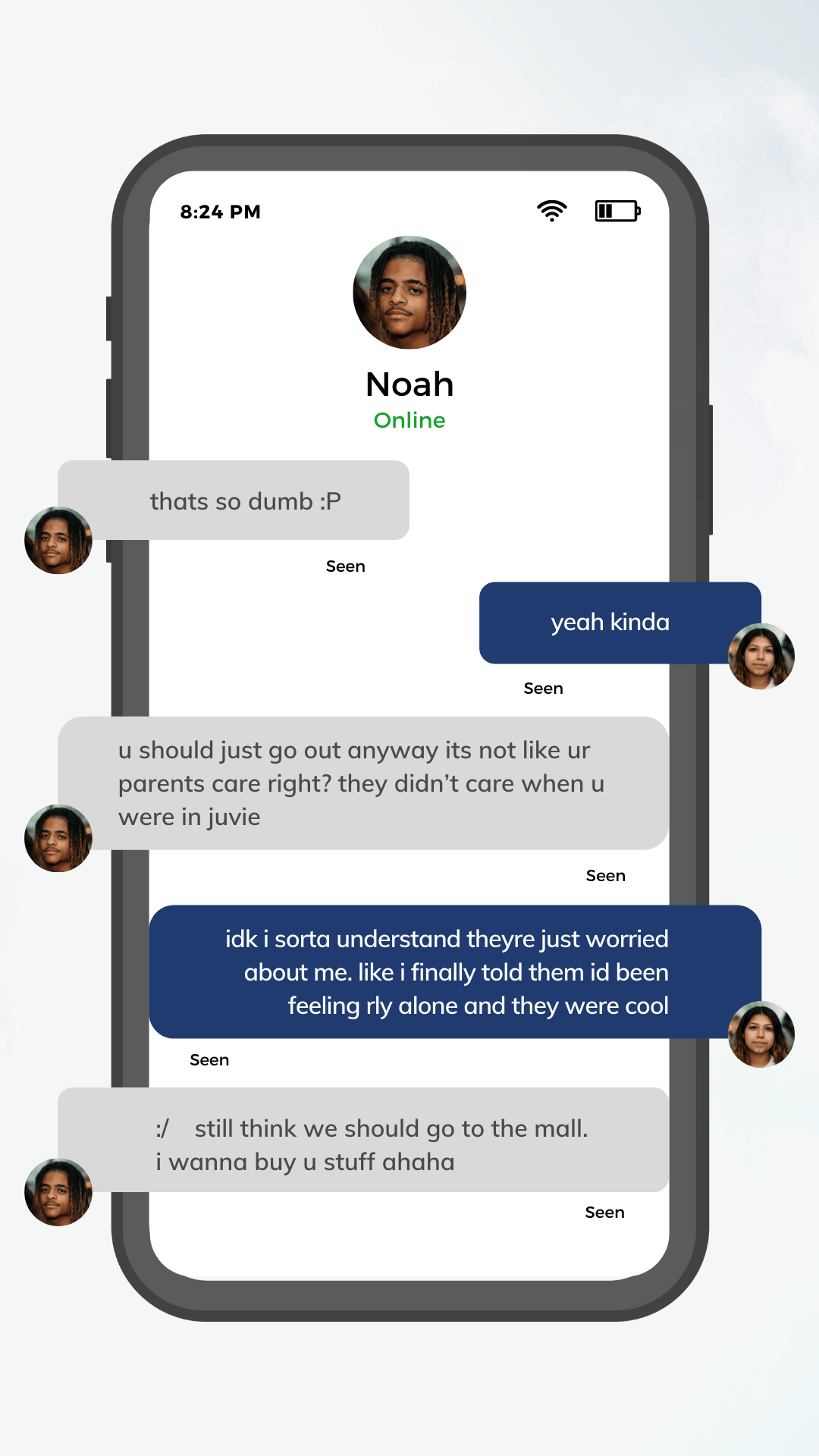
Eventually, Ava’s parents were so impressed with her progress at secondary school that when she caved to Noah’s request and asked to go to the mall with “a group of friends from school,” they said yes.
But instead of feeling pure happiness, Ava felt uneasy; after all, she was lying to her parents to go see Noah. Something felt … off.
Yet Noah had been nothing but nice to her. Surely, she at least owed it to him to hang out? After all, he was there for her during some of her hardest days. Plus, Ava had never gone on a shopping spree before!
One date couldn’t hurt – right?
Ava climbed into the metro bus by herself and headed to the mall to meet Noah in person for the first time.
Give a gift today and empower youth like Ava to build the self-confidence and courage to reject manipulative dates.
It didn’t take long for Ava to realize Noah wasn’t what she thought he’d be.
For one, he belittled Ava’s happiness with Real Talk. As he paid for her new jacket, Noah told Ava the group was nothing but touchy-feely crap – that the facilitator was only in it for his paycheck. Ava’s shoulders sank and her face dropped … but she didn’t reply.
It felt like whiplash to hear Noah abruptly switch from doting to critical.
They were walking into Forever21 when Noah wouldn’t stop trash-talking Ava’s parents. He insisted their rules were ridiculous and unfair.
Ava’s stomach twisted, but she finally found her voice: “Don’t talk about them like that.” She confessed about her recent conversation with her parents, how they were working to rebuild their relationship.
Noah went silent. Silent and angry. He shot a glare at her, and his eyes darkened. The light she saw before vanished. Ava clutched her shopping bags in a desperate grip. This wasn’t okay. Noah was a manipulator, just like she learned in Real Talk.
Desperately wanting to leave, Ava saw a window when Noah went to the restroom. She dropped her bags and ran out of the mall.
Please, be the reason youth like Ava can realize the truth before it’s too late!

The next day at school, Ava told her teacher she wanted to speak with Taylor.
As soon as she heard his voice over the phone, the dam broke. Ava told him everything. Taylor listened without interrupting. After Ava finished her harrowing story, Taylor told the young woman how proud he was of her courage. He would make sure she was safe.
Taylor quickly relayed Ava’s situation to UAHT’s partners in local law enforcement and connected Ava to the juvenile probation department’s mental health program. Ava blocked Noah’s number.
For the first time in a very long time, Ava felt seen. She felt heard. And, most of all, she felt hope. Things were going to get better. She was going to get better.
I will try to dig myself out of my deep and dark cave, and this group helped me a lot.
Without emotional support, healthy life skills, and the knowledge to recognize red flags, youths can fall too deep into manipulation to escape. They will continue being targeted by people like Noah. That’s why UAHT’s prevention work is vital to the fight against human trafficking.
With YOUR help, UAHT can walk alongside more young people like Ava while they navigate an uncertain world. You can ensure all youth get the attention and compassion they deserve, no matter their situation.
Please, donate to UAHT today to bring hope to vulnerable kids!
*Ava’s story is inspired by a compilation of our Real Talk participants’ experiences.





